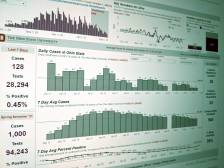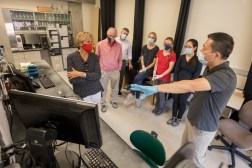How Cornell uses robots, data to run COVID-19 tests quickly

When Cornell University prepared to bring students back to campus and reintroduce in-person classes for the fall semester, setting up a mass testing program to track COVID-19 cases became a top priority. It has allowed the university to keep students, faculty and staff safe during the ongoing health crisis, university health experts said during an online event this week.
Ensuring that the university could keep tabs on infection rates and mitigate outbreaks through frequent and large-scale testing was the only way that people would be able to return to campus safely, Kim Potter, operations manager for the Cornell COVID-19 Testing Laboratory, said during a US Ignite webinar on Monday. To set up this mass testing program, Potter said she and her colleagues relied heavily on technology — including robotics and data management tools — to streamline processes.
Both Potter and Diego Diel, the director of the Cornell COVID-19 Testing Laboratory, had experience with high-volume diagnostic testing. They’d worked in Cornell’s veterinary diagnostic lab, and the team was able to apply many of the same processes to COVID-19 testing, she said, like using robots to process and test the samples.
“There are multiple different robotic instruments that are available,” Potter said. “So we didn’t have to build anything new. We took what we already knew and we just modified it to fit for COVID.”
Cornell’s COVID testing team used its robotic instruments in several steps of the testing process, including preparing collection tubes, processing samples and collecting data, which has been crucial to accelerating testing, Potter said.
This technology has allowed the school to administer 30,000 tests every week, return results within 24 hours and trace cases to limit disease spread, according to the university. Since Sept. 1, the COVID testing team has processed more than half a million tests.
To further speed up testing on campus, the lab also developed a sample pooling strategy, Diel said; rather than test one sample at a time, the lab’s robots combine samples into a single tube and test them in batches.
“We collect individual swabs, we placed them in individual tubes and then once they arrive in the lab we will mix them … and then perform one single test on those five samples,” Diel said. “The whole idea of using pool testing is that you increase the efficiency … and you reduce the cost significantly of the testing program.”
The next step of the pooling process, should a combined sample test positive for COVID-19, is to go back and retest those samples individually, he said.
With such a high volume of testing going on at Cornell, data management has also been a crucial part of the testing process, he said. The flow of data begins with registration of patients at collection sites, and that data is then stored in a system managed by the local hospital, he said. Samples are then collected and sent to the lab for testing where data is collected into a separate laboratory management system.
Once the lab has the test results, that data is sent back to the local hospital’s system which can notify patients if they’ve tested positive or negative, but these two data sets are kept separate to protect patient privacy, he said.
Cornell’s robust testing process has limited the spread of disease and allowed people to return to campus safely during the pandemic, Potter said, allowing the university to focus on delivering education to students.




